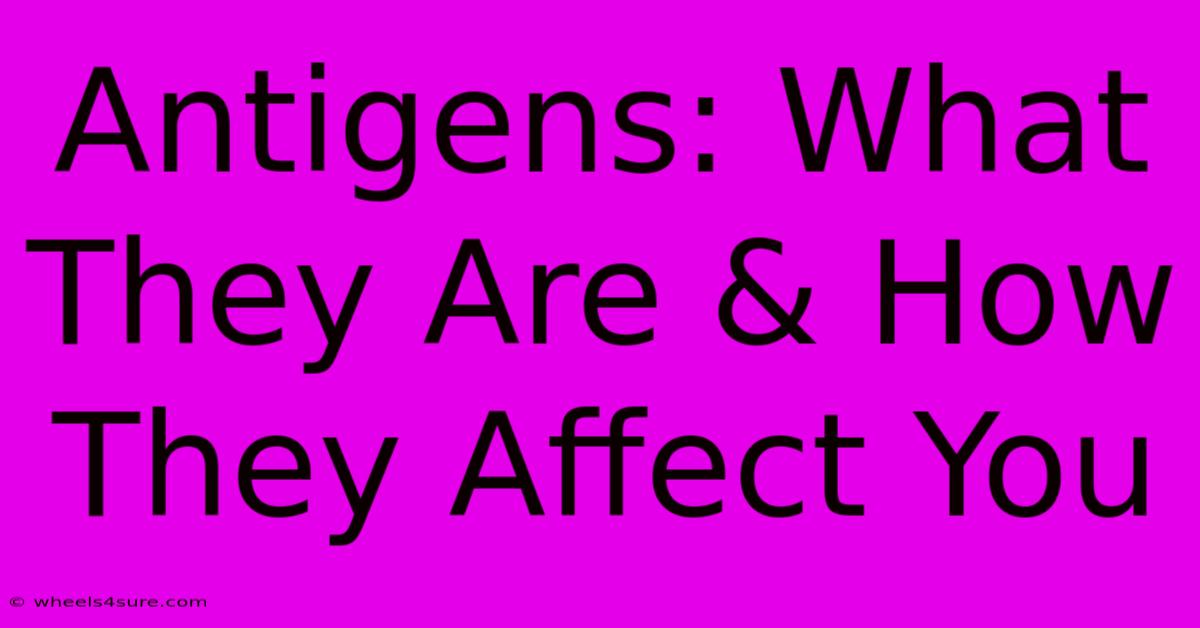Antigens: What They Are & How They Affect You

Table of Contents
Antigens: What They Are & How They Affect You
Understanding antigens is crucial to comprehending how our immune system works and how we fight off infections. This article will delve into the world of antigens, exploring their nature, their roles in health and disease, and their significance in various medical contexts.
What are Antigens?
Antigens are substances that trigger an immune response in the body. Essentially, they're molecules that are recognized as "foreign" by your immune system. This recognition leads to a cascade of events designed to neutralize or eliminate the threat. Think of antigens as the "invaders" that your immune system is constantly on the lookout for.
These invaders can be a wide variety of things, including:
- Bacteria: These single-celled organisms are common culprits behind many infections. Their surface proteins and other molecules act as potent antigens.
- Viruses: Even smaller than bacteria, viruses hijack our cells to replicate, and their proteins often trigger a strong immune response.
- Fungi: Certain fungi can cause infections, and their components act as antigens.
- Parasites: These organisms can live within or on our bodies, and their presence stimulates an immune response.
- Pollen: While not infectious, pollen can trigger allergic reactions because the immune system recognizes it as an antigen.
- Toxins: Harmful substances produced by bacteria or other organisms can also serve as antigens.
- Transplanted organs or tissues: The immune system recognizes these as foreign and may reject them, triggering an immune response.
- Cancer cells: These abnormal cells often display unique antigens that can be targeted by the immune system (or immunotherapy).
Types of Antigens
Antigens can be broadly categorized into two types based on their origin:
- Exogenous antigens: These originate from outside the body. Examples include bacteria, viruses, pollen, and toxins.
- Endogenous antigens: These originate from within the body. This includes abnormal cells like cancer cells or cells infected with viruses.
How Antigens Affect You: The Immune Response
When an antigen enters the body, it's detected by specialized cells within the immune system, notably B cells and T cells. This recognition triggers a complex series of events:
-
Antigen Presentation: Antigen-presenting cells (APCs), such as macrophages and dendritic cells, engulf and process the antigen, presenting fragments of it on their surface using specialized molecules called Major Histocompatibility Complex (MHC) proteins.
-
T Cell Activation: Helper T cells recognize the antigen fragments presented by APCs and become activated. These activated T cells then help coordinate the immune response.
-
B Cell Activation: B cells recognize the antigen directly and become activated. Activated B cells differentiate into plasma cells, which produce antibodies.
-
Antibody Production: Antibodies are proteins that specifically bind to the antigen, neutralizing it or marking it for destruction by other immune cells.
-
Cell-mediated Immunity: Cytotoxic T cells, another type of T cell, directly kill infected cells or cancer cells displaying the antigen on their surface.
Antigens and Disease
Antigens play a central role in many diseases. Infectious diseases are caused by pathogens (like bacteria and viruses) that contain antigens that trigger an immune response. The effectiveness of this response determines the outcome of the infection. A strong immune response can clear the infection, while a weak response can lead to prolonged illness or chronic infection.
Allergic reactions are also driven by antigens. In these cases, the immune system overreacts to harmless substances like pollen or certain foods, triggering inflammation and other symptoms.
Antigens and Medical Applications
Understanding antigens has led to several important medical advancements:
- Vaccines: Vaccines introduce weakened or inactive forms of antigens to stimulate an immune response without causing illness. This creates immunological memory, protecting against future infections.
- Immunotherapy: This rapidly evolving field uses the body's own immune system to fight diseases like cancer. It often involves manipulating or targeting specific antigens associated with cancer cells.
- Diagnostic Tests: Many diagnostic tests utilize antigens to detect the presence of specific pathogens or antibodies in blood samples.
In conclusion, antigens are fundamental to our understanding of immunity and disease. Their role in triggering immune responses, their involvement in various illnesses, and their significance in modern medicine underscore their critical importance. Continued research into antigens will undoubtedly lead to further advancements in disease prevention and treatment.

Thank you for visiting our website wich cover about Antigens: What They Are & How They Affect You. We hope the information provided has been useful to you. Feel free to contact us if you have any questions or need further assistance. See you next time and dont miss to bookmark.
Featured Posts
-
Cocoa Tea Daughter The Taste Of Serenity
Mar 31, 2025
-
Que Son Los Refranes Para Ninos Age Appropriate Explanations
Mar 31, 2025
-
Robert Herjavecs Net Worth A Billion Dollar Blueprint
Mar 31, 2025
-
Ashley Ortega Age A Story Of Perseverance
Mar 31, 2025
-
Post Malones Net Worth A Roadmap To Success
Mar 31, 2025
